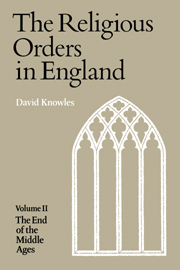Book contents
- Frontmatter
- Contents
- Preface
- List of Abbreviations
- Part One The Historical Framework
- Part Two The Institutional Background
- Chap. XVII Recruitment, employment and the horarium
- Chap. XVIII The wage-system and the common life
- Chap. XIX The election and privileges of the superior
- Chap. XX The numbers of the religious
- Chap. XXI Literary work
- Chap. XXII The monasteries and society
- Chap. XXIII Vicarages, the cure of souls and schools
- Chap. XXIV Public obligations of heads of houses
- Chap. XXV The monastic economy, 1320–1480
- Chap. XXVI Monastic Libraries
- Chap. XXVII Retrospect
- Appendix I Chaucer's monk
- Appendix II Henry V and the Westminster recluse
- Appendix III Regulars as bishops
- Bibliography
- Index
Chap. XXII - The monasteries and society
Published online by Cambridge University Press: 28 January 2010
- Frontmatter
- Contents
- Preface
- List of Abbreviations
- Part One The Historical Framework
- Part Two The Institutional Background
- Chap. XVII Recruitment, employment and the horarium
- Chap. XVIII The wage-system and the common life
- Chap. XIX The election and privileges of the superior
- Chap. XX The numbers of the religious
- Chap. XXI Literary work
- Chap. XXII The monasteries and society
- Chap. XXIII Vicarages, the cure of souls and schools
- Chap. XXIV Public obligations of heads of houses
- Chap. XXV The monastic economy, 1320–1480
- Chap. XXVI Monastic Libraries
- Chap. XXVII Retrospect
- Appendix I Chaucer's monk
- Appendix II Henry V and the Westminster recluse
- Appendix III Regulars as bishops
- Bibliography
- Index
Summary
THE INFLUENCE OF THE MONKS
The position of an abbot and his monastery in contemporary society had altered considerably between the twelfth century and the age of the Lancastrian kings. In some ways it was less important. In earlier times, when the great monastery was the only organized community and almost the only institution in the land, as well as being the most powerful religious and intellectual centre, the abbot had been an important tenant-in-chief, an equal among the great barons and their superior in education and prestige, a member of the Great Council, often in attendance on the king at home and abroad, or acting for him in the public life of the country, and in every way the social equal of the bishops. Now, both abbot and monastery had passed into the background of public life. The intellectual leadership had passed to the universities and the spiritual leadership, so far as it existed at all, was shared by all the religious and bishops in so far as any of them by personal character were able to assert it. Abbots, as figures in the national life, had fallen far behind the bishops and were rarely employed on public business; though a number of the heads of important houses received regular summons to parliament they were rarely members of the King's Council, now chiefly composed of ambitious magnates and high officials.
- Type
- Chapter
- Information
- Religious Orders Vol 2 , pp. 280 - 287Publisher: Cambridge University PressPrint publication year: 1979



